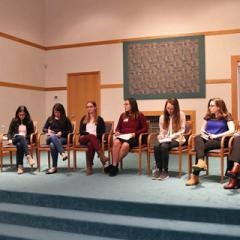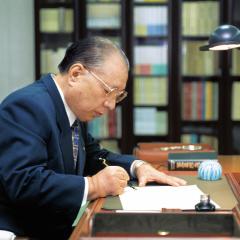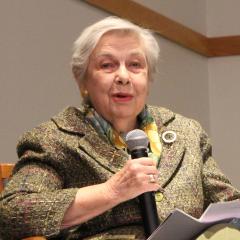Joseph Rotblat: Thinking Beyond Nuclear Weapons
Sir Joseph Rotblat (1908 - 2005) was Professor of Physics at the University of London at St. Bartholomew’s Hospital Medical College and the hospital’s Chief Physicist from 1950 to 1976. In 1955, Professor Rotblat was one of the eleven signatories of the Russell-Einstein Manifesto, which invited scientists from around the world to ward off the danger of nuclear weapons being used again. He founded the Pugwash Conferences on Science and World Affairs in 1957 and served as its secretary-general and later as its president for forty years. In 1995, Dr. Rotblat and Pugwash received the Nobel Prize for Peace. This interview was conducted when Professor Rotblat visited the Boston area in 1997 to deliver a keynote address at the New England Organizing Conference for Nuclear Weapons Abolition.
What motivated you to devote yourself to the nuclear abolition movement?
The main reason is my involvement in the atomic bomb project. Although it went against my principles as a scientist, I was afraid in 1939 that the German scientists under Hitler would make the bomb, and that then he would win the war. This I could not accept, so I developed a philosophy that the only way to prevent Hitler from using his bomb against us would be if we threatened him with retaliation.
I joined the Manhattan Project later on, and I could see that it would take much longer to make the bombs than we had imagined. At the end of 1944 I was informed that the Germans had given up. As soon as I found this out, I resigned from the Project. It was not easy, but eventually I was given permission to leave on the condition that I would not talk to anybody about this. I was completely cut off and didn’t know anything until I heard the BBC announce on the sixth of August about the Hiroshima bomb. This came as a terrible shock to me because my idea was to make the bomb to prevent its being used, and here it had been used immediately after it was made, against civilian populations. I began to despair about the future of mankind, and I felt, “we must stop this.”
What were some of the first steps you took in this direction?
I did two things. I changed my whole line of scientific work, from nuclear physics to medical physics, because there I could see immediately that what I was doing had some effect to help patients. Then I began to speak to my fellow physicists in England about the dangers. This was the beginning of a movement known as the Atomic Scientists Association. In the United States there was a corresponding body called the Federation of American Scientists, which is still very strong. These two organizations worked in parallel, and we tried to evolve a policy about nuclear energy and nuclear weapons. The very first resolution of the United Nations General Assembly in January of 1946 was to try to set up a commission to see how we could get rid of all nuclear weapons. This was largely the work of scientists. Unfortunately, it became impossible because of the antagonism that existed between the Soviet Union and the United States.
When we failed at the government level, I thought I would go to the popular level. I organized an exhibition called “Atom Train,” which was two carriages fitted out with experiments to explain to the public what nuclear energy is, for good or evil. It was very successful all over England, Wales, and Scotland.
Did the Pugwash Group come out of some of the work of these early organizations of scientists?
That’s right. We worked together with this group of scientists in the United States, but quite early we realized that talking to each other was not enough. We had to bring in the Soviet scientists for there to be any hope of achieving something. But during the Stalin regime, you couldn’t expect that the scientists would be allowed to come and talk about these problems, so we had to wait until Stalin died and Kruschev’s regime was established.
The initiative came first from Bertrand Russell and Albert Einstein. We came out with the Russell-Einstein Manifesto in 1955, which made an enormous impression at the time. The main idea was to bring together a group of scientists who were knowledgeable in this field and could make a proper assessment of the danger, because the government was trying to minimize it so people wouldn’t believe that radiation was dangerous. Soon after the Manifesto was published, Cyrus Eaton, a Canadian, offered to pay for the expenses of a conference on the condition that it was held in Pugwash, a small village in Canada. It was the first time scientists of eminence had come together from both sides of the Iron Curtain. It was a great success, and we decided to continue by setting up the Pugwash Conferences on Science and World Affairs.
Although yours is a group of eminent specialists, it has remained a people’s movement, maintaining its nongovernmental status. As such, your work and publications have been particularly important.
Yes, we’re independent, but we had great difficulties in the early years about these meetings, because anybody in the West who was willing to sit down with scientists from the other side of the Iron Curtain and talk to them about peace was suspect. Those scientists who agreed to come showed great courage in doing this, because it could have affected their careers.
Then after a few years, the reverse occurred. The British and American governments recognized the real importance of Pugwash. So they tried to take over. We had to keep a very narrow path of neutrality, not to fall on either side. And this was the reason why we were successful.
What do you think are the greatest obstacles today to nuclear disarmament and abolition?
The greatest obstacles are “fossilized” minds, particularly among the military, who simply cannot adapt themselves to the new situation. The need for nuclear weapons arose from a situation during the Cold War when many people believed that the Soviets intended to govern the world with their very strong conventional weapons. This is how it started, with the stockpiling of nuclear weapons to prevent a conventional attack.
Now we have exactly the reverse. The West is much stronger in conventional arms than the Russians are, and we continue to say we need nuclear weapons in order to prevent an attack from the other side. Once the Pentagon and British higher military circles got used to the idea that we need nuclear weapons, they’ve been unable to get away from it.
How have you maintained your own sense of perseverance and dedication in the face of obstacles through the years?
It’s very simple. I just don’t give in. Because I think, what is the alternative? The alternative is to give in and say, all right, the world will come to an end. This of course is completely unacceptable. There’s no alternative here. And therefore I have to keep on. Of course, I am frustrated by seeing that the proposals we put forth are not accepted. But one has to be patient, keep on, and then there is great satisfaction in seeing many of these people come around to your point of view. This gives you hope that it will go further from there.
Could you share your thoughts about the social responsibility of scientists toward creating a sustainable environment and protecting life?
This is very important, and it is the main purpose of Pugwash — to make sure that scientists’ work is not causing damage to human society and the environment.
When I was young the First World War broke out, and it had a tremendous effect on me. It was terrible from the physical point of view. My dream was that science should help mankind. Now, looking back, I see this dream has come true to a very large extent. Because of science, even the poorest person is better off now. Science can do a great deal of good, but it can also do a great deal of damage. We have to realize that what we are doing has an impact not only on the life of every individual, but also on the whole destiny of humankind.
I do not belong to a religious body; nevertheless, I strongly believe in the value of human life. Human life is of supreme importance, and therefore I feel that whatever we do, we must make sure that life goes on.
The elimination of war is coming about. Look at the world today compared with the time when I was young. In the last two world wars the mortal enemies were Germany and France; now the idea of Germany and France fighting is just inconceivable. There has been a complete revolution, but people don’t realize how much progress we’ve already made in this direction.
Nowadays any type of military conflict could escalate, involve the rest of the world, and bring down humanity. Therefore, we have to develop in ourselves a sense of loyalty to humankind. This is an important thing that each of us can do. Each of us has a number of loyalties: the family, our circle of work, the village, a town, nation. This is where it has stopped. At the moment, loyalty to the nation is supreme. What I’m saying is that without giving up loyalty to the nation, extend it to all of humankind. This is where we have to go.


